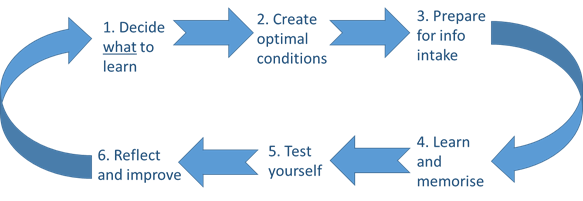How To Learn Faster In Six Steps
The amount that you learn largely determines the quality of life that you live.
I am not talking about ‘learning’ in a purely academic sense, or the learning of purely factual information, but rather learning things that enable you to live well in work, social life and beyond. Everything that you are able to do, from speech and the ability to walk to forming opinions and performing complex tasks, is something that you have learnt at some point during your life. We have a very limited amount of time on earth and the faster we are able to learn, the more progress we will be able to make during our short lifespans. Ultimately, our rate of learning determines our happiness and fulfilment in life.
To that end, the following 6-step guide collates information from numerous sources to detail the core cycle of deliberate learning, with advice on how to increase efficiency at each step:
The six steps to learning faster
1. Decide what you are going to learn.
This is arguably the most important step. Prioritise — decide what the single most important thing for you to learn at that moment in time is then focus solely on that task. Don’t set yourself unrealistic amounts of work to do, or you’ll continuously get frustrated, but equally don’t set the bar too low or you may fall victim to Parkinson’s Law (google it).
A useful technique to try before starting any task: write out the 6 most important things you could be doing right now. Number them from 1–6 in terms of importance. Work on number 1 until completion (without stopping or switching to any other task). Then do number 2, number 3 and so on. This is the most time-efficient method of completing any particular task as you will focus all your mind power on one task at a time. If you run out of time and have only finished the top one or the top two, this is not a problem! You have done the most important thing you needed to do and there is no way in that period of time you would have done more.
2. Create the optimal conditions for learning.
Create the best external and internal environment to enhance your learning.
Externally, remove any distractions that are going to disrupt your work. If you are often distracted by your phone, turn it off or put it in another room. If there’s a website you spend a lot of time on, block it (Not sure how to block websites? There are many ways (google it) — I use the ‘StayFocusd’ extension for Chrome). If there’s something that distracts you, find somewhere to study where that won’t be a problem. Don’t make excuses to yourself — work around whatever obstacles may arise.
Internally, create the right frame of mind to learn. Be relaxed, calm and confident in your ability to learn. There’s a difference between this and arrogance, which is fragile and unhealthy. Different successful people use different ways to develop this state. Some meditate, others pray, some people have mantras that they repeat to themselves, others visualise the things they can do if they finish their work promptly (eg. spend time with friends, family, a boyfriend or girlfriend). Examples of mantras include ‘I can learn anything that I want to learn to achieve anything that I want to achieve’, ‘every day I’m learning more and progressing towards my goal’ or simply the words ‘ambition’, ‘success’, ‘A*’ can have similarly positive effects. Feel free to use these or come up with something more personal to you.
3. Prepare for intake of information.
This should be guided by you. Before you start, ask yourself the following questions:
- What do you already know about the topic? -> Write it out from memory. It’s important to know your starting point
- What don’t you know? What don’t you understand? Write a set of questions before you start to have in the back of your mind as you study, to act as a mental prompt and keep you on track. When you’re finished, check that you can now answer these questions from memory.
Work out how you best take in information. You may have heard of ‘visual’, ‘audio’ and ‘kinaesthetic’ learners. In reality, everyone uses a combination of the three to varying degrees. Research different techniques, and come up with your own, that utilise the different modalities — put them into practice and see what works for you.
4. Learn and memorise the information.
A lot of research has been done into memory consolidation and it has been well established that spaced repetition is one of the best ways to learn and remember information. Every time you recall a piece of information from your own memory, this memory will be strengthened and thus you will remember it for longer.
A practical way to apply this information is as follows: when you learn some new information, for example in a lesson or a revision session, recall it from memory and review your notes after about one hour, then one day, then one week, then one month, then six months and then one year. You will be amazed by how much you can remember, and how long for, if you follow this pattern. Also note that the principle is much more important than the exact time spacing — feel free to adjust it around your life and schedule as required.
A useful piece of free software that can help with spaced recall is ‘Anki’, which is available on computers as well as smart phones. It lets you create your own flashcards then will present them to you at increasing time intervals.
5. Test yourself.
There’s no way to be certain that you’ve taken on board new information until you test yourself. Here are some suggestions but feel free to come up with your own:
- Recall the information from memory — for example write a three sentence summary of what you have learnt, write a short essay or make a poster — you can be creative.
- Discuss it with a friend or try to teach it to someone who doesn’t understand it. Albert Einstein once said ‘If you can’t explain it to a six year old, you don’t understand it yourself’.
- Practice exam questions (if learning for an exam) — don’t wait until someone else sets them for you; find your own and see which you can answer and which you can’t!
This stage is important as it will highlight to what level you understand the information. It is an easy and common trap to fall into to simply rote learn something without truly understanding it. If you develop a true understanding of a topic, you will remember it much better as you will be able to ‘work it out’ based on the parts that you can remember.
6. Reflect and improve for next time.
Learning is a continuous process that you will continue to do for the rest of your life, whether you realise it or not. The rate at which you learn is largely determined by the amount of time you spend reflecting on your learning and thinking of ideas for improvement.
The key with all of the aforementioned steps is to experiment continuously and critically assess what is working and what isn’t. Don’t be disheartened if you can’t see obvious improvement at times — progression is rarely linear and I can promise that if you persist you will see massive changes over time.
Ask yourself these questions regularly: What worked well and what didn’t? Where could you improve?
Other ways that you can increase that rate at which you learn include:
- Ask other people for feedback. Be accepting of this feedback! If someone is giving you criticism or something you don’t agree with, don’t step in and defend yourself — keep silent for as long as you can and then reflect on what they have told you. Aim to view yourself as objectively as possible.
- Always be open to new tips and advice on how to learn. The best approach is to cherry-pick from the inexhaustible information that is out there — try things you hear about and if they work, use them and if they don’t, discard them.

Congratulations on making it to the end of this article. However, having read this article will mean nothing if you don’t apply it. Print this off and put it on your wall, by your desk, or somewhere else where you will see it often. Save it on your phone. Repeat these six steps over and over until it becomes second nature — in the words of the wise Uncle Drew:
“Master the fundamentals, so you can forget them. Then you can improvise and just concentrate on what really matters.”
